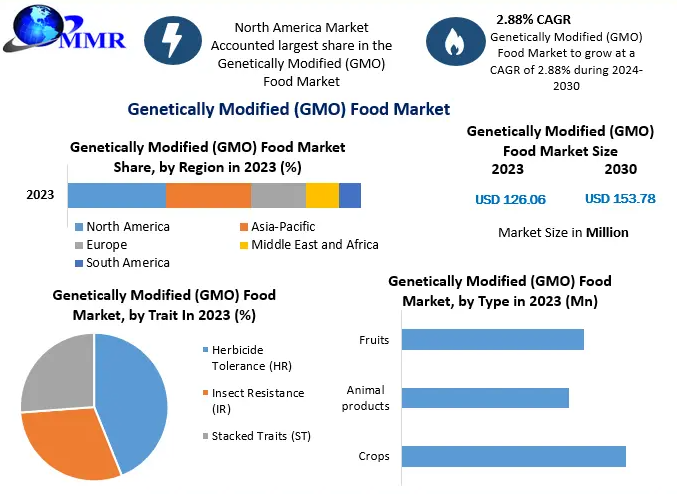Genetically Modified (GMO) Food Market Forecast: Growth Potential Across Emerging Economies

Market Overview
The Global Genetically Modified (GMO) Food Market was valued at US$ 126.06 Mn in 2023 and is projected to reach US$ 153.78 Mn by 2030, growing at a CAGR of 2.88% during the forecast period (2024–2030).
The market is driven by the rising global population, increasing demand for nutritious and high-yield food products, and the need to optimize agricultural productivity amid shrinking arable land.
Genetically modified (GM) foods are developed using advanced genetic engineering techniques to enhance crop yield, pest resistance, herbicide tolerance, and nutritional content. However, regulatory restrictions, environmental concerns, and low consumer acceptance in certain regions remain major challenges.
Gain Valuable Insights – Request Your Complimentary Sample Now @ https://www.maximizemarketresearch.com/request-sample/29007/
Market Dynamics
✅ Key Drivers
-
Rising Global Food Demand – Growing population and food security concerns have accelerated the adoption of genetically engineered crops to increase yield and resilience.
-
Decreasing Arable Land – Limited cultivable land is encouraging the use of high-yield GMO crops.
-
Reduced Pesticide Usage – GMO crops engineered for pest resistance lower dependency on chemical pesticides, improving sustainability.
-
Increased R&D in Biotechnology – Continuous investments in genetic engineering and biofortification are expanding market opportunities.
-
Nutritional Enhancement – Bio-fortified crops with higher vitamins, minerals, and healthy fatty acids are gaining consumer traction.
⚠️ Restraints
-
Stringent Government Regulations – Approval processes for GM crops and foods are complex, especially in Europe and parts of Asia.
-
Environmental and Health Concerns – Possible impacts on biodiversity, soil fertility, and long-term health outcomes limit adoption.
-
Consumer Perception – Misconceptions about GMOs’ safety and ethical concerns regarding genetic manipulation reduce market acceptance.
🚀 Opportunities
-
Increasing demand from emerging economies such as India, China, and Brazil.
-
Advancements in stacked trait technology combining multiple beneficial genes.
-
Development of climate-resilient and bio-fortified crops for nutrition and sustainability.
Feel free to request a complimentary sample copy or view a summary of the report: https://www.maximizemarketresearch.com/request-sample/29007/
Market Segmentation
By Type
-
Crops – Dominates the market with the largest share, led by corn, soybean, and cotton.
-
Vegetables & Fruits – Expected to see growing adoption for extended shelf-life and improved nutritional quality.
-
Animal Products – GM feed contributes indirectly to GMO food production.
By Crop
-
Corn – Represents nearly 85% of GMO food production globally due to herbicide resistance and high yield.
-
Soybean – Heavily modified to increase oleic acid content and reduce cholesterol.
-
Cotton, Canola, Sugar Beet – Significant contributors to the overall GMO crop market.
By Trait
-
Herbicide Tolerance (HT) – Simplifies weed management and reduces costs.
-
Insect Resistance (IR) – Decreases pesticide use and environmental impact.
-
Stacked Traits (ST) – Fastest-growing segment; combines multiple benefits such as pest resistance, drought tolerance, and nutritional improvement.
Regional Insights
🌎 North America
-
Leading region due to early adoption, strong R&D, and presence of major biotech players.
-
The U.S. dominates with widespread cultivation of GM soybean, corn, and cotton.
🌍 Europe
-
Stringent regulations limit GMO cultivation.
-
However, Europe is a major importer, especially of GM maize, soybean, and sugar beet.
-
Recently, 17 new GMO products have been approved for import, signaling gradual openness.
🌏 Asia Pacific
-
Fastest-growing region, driven by large population and food demand.
-
Countries like India, China, and Japan are investing in agricultural biotechnology.
-
Increasing government initiatives to enhance crop yields and adopt GM crops.
🌍 Latin America
-
Brazil and Argentina are major exporters of GMO crops.
-
Favorable agricultural policies and large-scale cultivation strengthen the market.
🌍 Middle East & Africa
-
Growth is moderate but increasing adoption in countries like South Africa due to food security concerns.
Dive deeper into the market dynamics and future outlook: https://www.maximizemarketresearch.com/request-sample/29007/
Key Players:
-
BASF SE
-
Bayer AG
-
Syngenta AG
-
Monsanto (Now part of Bayer)
-
DuPont (Corteva Agriscience)
-
Groupe Limagrain
-
Dow Chemical Company
-
KWS SAAT SE
-
Sakata Seeds
-
Dalmia Continental Pvt. Ltd
-
Jivo Wellness Pvt. Ltd
-
Ambar Protein Industries
-
Vimal Oil & Foods Ltd
-
ACH Food Companies Inc
These companies are focusing on new product launches, biotech collaborations, and regulatory compliance to expand their global footprint.
Conclusion
The Global Genetically Modified (GMO) Food Market is evolving steadily, driven by food security concerns, biotechnology advancements, and increased yield efficiency.
While regulatory and perception barriers persist, ongoing innovation in stacked traits, nutritional enhancement, and climate adaptation positions the market for sustainable long-term growth.
- Art
- Causes
- Crafts
- Dance
- Drinks
- Film
- Fitness
- Food
- Jogos
- Gardening
- Health
- Início
- Literature
- Music
- Networking
- Outro
- Party
- Religion
- Shopping
- Sports
- Theater
- Wellness
